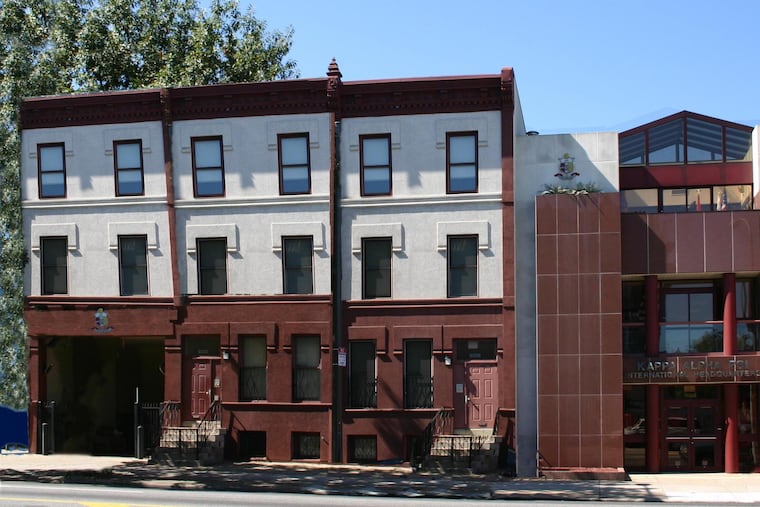Philly-based fraternity official sentenced to more than 2 years in prison for embezzling nearly $3 million
“Every dollar that is gone from [his] crimes is a dollar that can’t be used for the charitable and for the social uses the fraternity would normally put them to,” prosecutors said.

A former executive at one of the nation’s largest Black fraternities was sentenced to two and a half years in federal prison this week after admitting to embezzling nearly $3 million to fuel a gambling addiction.
In court, Curtis D. Anderson, who served as finance director for the Philadelphia-based Kappa Alpha Psi, turned toward a gallery filled with fraternity brothers, his family, and members of his church and begged for their forgiveness.
“I lost myself in a very dark season of my life to a true beast — an uncontrolled gambling addiction,” he said, adding: “But that’s not an excuse for what I did, and I’m honestly sorry.”
He gripped the podium and stood — back straight, chin lifted — when it came time for his punishment to be imposed.
“What I see before me is a 60-year-old man who abused his employer’s trust and is now a shamed and convicted man,” U.S. District Judge Timothy Savage said.
But crediting Anderson’s efforts to seek treatment and make up for his crimes since, the judge added: “He enjoyed a wonderful reputation and all of that has been shattered. … That is punishment. Punishment to carry the shame. Punishment to worry about what people that always looked up to you think of you now. I can’t order that.”
In the end, the 30 months Savage ordered Anderson to spend behind bars during a hearing Tuesday was significantly less than that recommended by federal sentencing guidelines or what either the prosecutors or even the defense had asked for.
Anderson, of Claymont, Del., pleaded guilty to counts of wire fraud and aggravated identity theft last year stemming from the money he siphoned from Kappa Alpha Psi over a period of six years.
The fraternity fired him in 2018 after officials discovered he’d been pilfering fraternity funds using checks he had either made out to himself or individuals whose signatures he forged while exchanging them for cash.
Santander Bank flagged the unusual transactions and alerted the fraternity. When its leaders went to the bank two days later to discuss the missing funds, they spotted Anderson ducking out of the branch after making yet another unauthorized withdrawal and confronted him.
Anderson immediately confessed and cited his uncontrolled gambling.
At his worst, his attorney Brian J. Zeiger said in court filings, he was incurring gambling losses of up to $7,000 a day at area casinos and had liquidated his retirement and savings accounts in order to place more and more bets.
“At no point in time, has Mr. Anderson ever said anything other than, ‘I totally did it,’ ” Zeiger said.
Since then, Anderson has undergone significant therapy, is a regular participant in Gamblers Anonymous, and has voluntarily put himself on a lifetime exclusion list for many of the largest casino chains, the lawyer explained in court Tuesday.
He is currently attending culinary school while working as a cook in the kitchen of a Catholic ministry serving the elderly poor in Wilmington.
Zeiger urged Savage to distinguish Anderson, whose thefts arose from a psychological compulsion from those who steal to fund a lavish lifestyle beyond their means.
But Assistant U.S. Attorney Mary E. Crawley insisted his sentence should also consider the harm he did to his fraternity.
“Every dollar that is gone from Mr. Anderson’s crimes is a dollar that can’t be used for the charitable and for the social uses the fraternity would normally put them to,” she said.
Kappa Alpha Psi was founded at Indiana University in 1911 and currently counts more than 27,000 members at 679 chapters across the country. At the time of Anderson’s thefts, it was struggling financially and had been forced to downsize including in Anderson’s department. He cited those cuts as stressors that contributed to his gambling compulsion.
The fraternity was only able to recoup roughly $250,000 in insurance payments after discovering Anderson’s thefts, Crawley said. And as a result, it was forced to impose new financial assessments on all of its chapters to cover the hike in insurance premiums.
Fraternity officials did not respond to requests for comment Tuesday but have said in previous statements that they have shored up their financial operations since discovering Anderson’s crimes to prevent similar situations in the future.
As part of his sentence, Anderson was also ordered to pay back the $2,939,973 he stole. Savage noted, however, it was unlikely that the fraternity would ever be made whole.
But still in his parting words from the bench, the judge offered encouraging words.
“I think you can [overcome] this,” he told Anderson. “You can be a better man if you want. Good luck.”